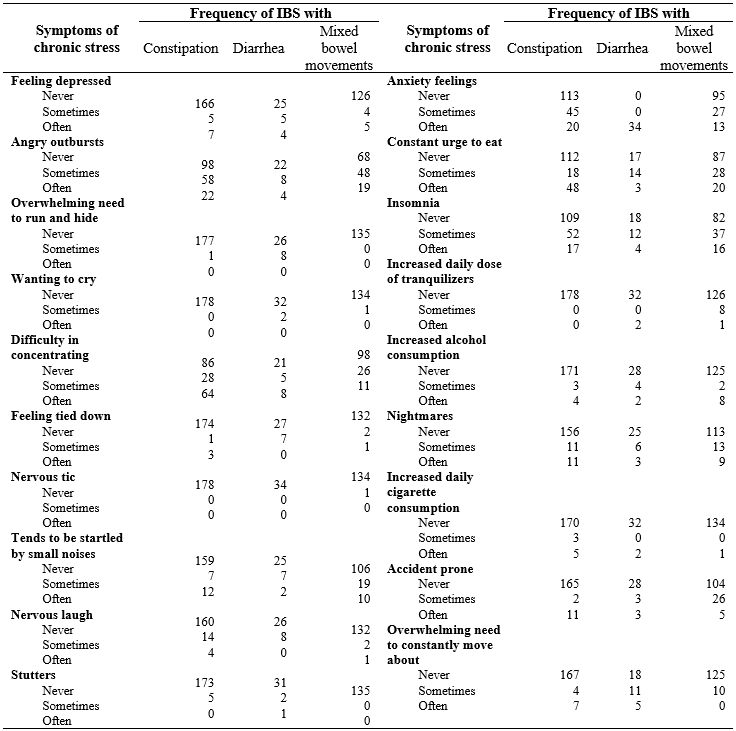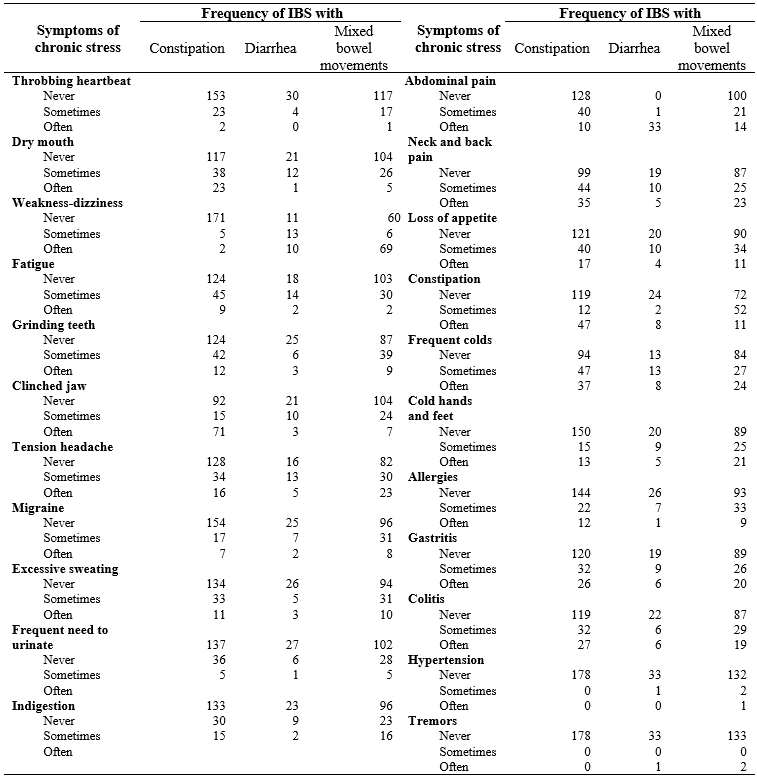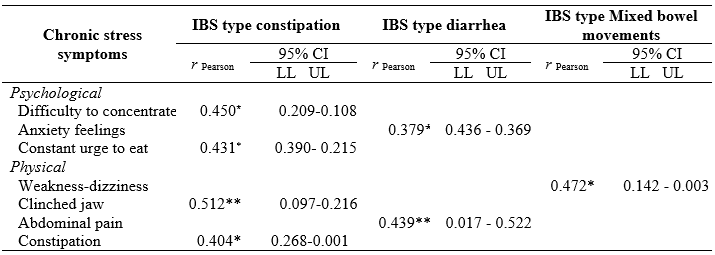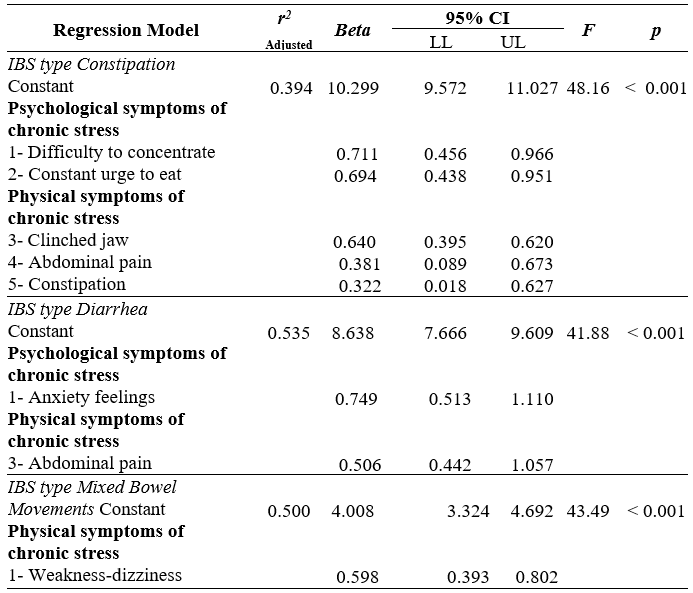Stress is one of the most frequent health problems in today’s society, a multivariable phenomenon resulting from the relation between an individual and the events of his or her environment. It is assessed as disproportionate or threatening to their resources and puts their health at risk. (Alfonso, Calcines, Monteagudo, & Nieves, 2015) Symptoms associated with stress accompany adjustment, anxiety, behavioral and emotional disorders (Maturana & Vargas, 2015). When stress levels are high, the organism weakens due to increased cortisol levels, creating psychological problems (anxiety and depression), behavioral problems (violent abuse, conflicts with classmates, addition to toxic substances, boredom or failure at school); and physical health problems (coronary disease, peptic ulcer, diabetes, hypertension, allergic diseases, infections and irritable bowel syndrome, among others) (Maturana & Vargas, 2015; Byrd & McKinney, 2012).
Irritable bowel syndrome (IBS) is a typical functional gastrointestinal disorder characterized by chronic, persistent abdominal pains due to bowel movement alterations that may vary from constipation to diarrhea, symptoms that worsen under stress (Alfonso, et al., 2015). This disorder affects between 10% and 15% of the adult population (Bautista, Ortiz, & Muñoz, 2011; Pozos-Radillo, Preciado-Serrano, Plascencia, Morales, & Valdez, 2018). Studies report prevalence in the United States, Europe and Asia with 10% and 20%. Between 14% and 24% is reported in women in China and Japan and between 15% and 19% in men. In Latin America, the prevalence in Brazil, Colombia, Mexico and Uruguay fluctuates between 9% and 18% (Bautista, et al., 2011).
It has been shown that the bidirectional communication system along the gut-brain axis plays a crucial role in maintaining homeostasis. In fact, several lines of evidence suggest that intestinal microbiome has a significant impact on cerebral functions and affects state of mind, recognition and behavior (Nishida, Sawada, Kuwano, Tanaka, & Rokutan, 2019).
Only 25% to 30% of irritable bowel syndrome patients in the United States are reported to have consulted a physician (their symptoms begin between 30 to 50 years old); this represents 2.4 to 3.5 million medical consultations. In Mexico, general physicians, internal medicine specialists and surgeons are who attend to patients with acute symptomology; they mention that this disorder is found in a wide age range from 15 to 40 years old (Bautista, et al., 2011).
We found in a review of the literature that stress is associated with the presence of IBS in medical students and affects different conditions such as their emotional state, physical health and/or interpersonal relationships (Bautista, et al., 2011; Nishida, et al., 2019). Some studies also show an association with psychological manifestations such as anxiety, frustration, nostalgia, social isolation and depression as well as physical symptoms such as migraines, muscle mobility problems and visceral sensitivity of gastrointestinal functions (Correa-Prieto, 2015; Perveen, et al., 2016; Sehonou, & Leoubou, 2018).
This study is based on transactional theory with a social cognitive focus that defines psychological stress as “a particular reaction between an individual and the surroundings that he or she judges to be threatening or overwhelming to his or her resources and puts his or her wellbeing in jeopardy” (Gonzalez, & Landero, 2008).
Therefore, the goal of this study was to identify psychophysiological symptoms of chronic stress as a predictor of irritable bowel syndrome in medical students at a public university in Mexico.
Method
Design
Quantitative, observational, cross-sectional analytical study.
Sampling / Participants
A cross-sectional analytical study was made during the 2014 school year. The target population was 1,101 medical students (48% men and 52% women); the average age reported was 21.30 (+1.82) ranging from 18 to 26 years old. A simple random sampling was made, and to determine the size, the expected prevalence was estimated at 64.5%, 70% as an acceptable minimum rate, and 99% accuracy. The sampling included 561 college students studying medicine at a public university in Guadalajara, Mexico.
Recruiting Process
The college student population was selected according to the random number technique, and was proportionate with respect to gender and school year from the list of students enrolled in the 2014 school year. Nevertheless, participation was voluntary and students responded to the survey with informed consent.
Instruments
It was used the Stress Symptoms Inventory (SSI) by Lipp & Guevara, 1994; lists 41 psychophysiological symptoms characteristic of chronic stress, based on the three-phase Selye model (alarm, resistance and exhaustion). The adaption by Dominguez (1998), for the Mexican population was applied; it reports a consistent internal Cronback alpha of 0.94, indicating an acceptable degree of reliability. (Pozos-Radillo, Torres, Aguilera, Acosta, & González, 2008) The surveyed party was asked to point out the presence of symptoms on a scale of one to three (1= never; to 3 = frequently) according to how he or she had felt over the previous six months. Frequency was scored according to the following classification: frequently (3), sometimes (2) and never (1).
Psychological chronic stress symptoms that the instrument considers are: feeling depressed, angry outbursts, an overwhelming need to run and hide, wanting very much to cry, impossible to concentrate, feeling tied down, nervous tic, tends to be startled by small noises, nervous laughter, constant urge to eat, insomnia, increased daily dose of tranquilizers, increased alcohol consumption, nightmares, increased daily cigarette consumption and an overwhelming need to move about constantly.
Physical chronic stress symptoms are: throbbing heartbeats, dry mouth, weakness-dizziness, fatigue, teeth-grinding, clinched jaw, tension headache, migraine, excessive sweating, frequent need to urinate, indigestion, neck and backache, loss of appetite, frequent colds, cold hands and feet, allergies, gastritis, colitis, hypertension and tremors, considered to be predictor variables of multiple regression.
IBS diagnoses are based on the ROMA III criteria, the clinical diagnostic criteria describing symptoms and the application of frequency and duration parameters, which allow for a more accurate IBS diagnosis (Shih, & Kwan, 2007).
ROMA III Criteria
The IBS diagnoses were based on the ROMA III criteria (criteria followed during the previous 3 months with an onset of symptoms at least 6 months prior to diagnosis):
Recurrent upset stomach or abdominal pain (means an uncomfortable nondescript sensation such as pain) at least 3 days / month during the last 3 months with 2 or more of the following: 1. improves after a bowel movement, 2. commences associated with a change of bowel movement frequency and 3. Commences associated with a change of bowel movements shape (appearance).
IBS is classified in terms of the seriousness of the symptoms on the Bristol Scale (Lewis, & Heaton, 1997), according to bowel movements consistency and according to type 1 (“separate hard lumps hard to pass”); type 2: (“sausage-shaped but lumpy”); type 3: (“like a sausage but with cracks on the surface”); type 4: (“like a sausage or serpent, smooth and soft”); type 5: (“soft blobs with clear cut edges”); type 6: (“fluffy pieces with ragged edges”); and 7: (“watery, no solid pieces”). IBS classification consisted of the following: if more than 25% of the bowel movements were type 1 or 2, the student was considered to have (“IBS with constipation”); if more than 25% of the bowel movements were type 6 or 7, the student was considered to have (“IBS with diarrhea”); and if more than 25% of both types (“1 or 2, 6 or 7), the diagnosis was (“IBS with mixed bowel movements”). On the other hand, students with type 3 or 4 bowel movements were considered normal (Yang, et al., 2014).
Ethical Considerations
The study was approved by the Ethics Committee of the Occupational Health Institute of the University of Guadalajara under reference number IISO / CI / 2012-2013. Guidelines of the 1975 Helsinki Declaration were adhered to at all times. The data was processed as provided by the General Health Law in effect in Mexico for research involving human beings.
Stadistical analysis
The Pearson correlation analysis was used to calculate association, to specify predictive value information and to determine the effectiveness of the measurements obtained. A step-by-step regression analysis was performed by simultaneously introducing an equation of the measurements at a meaningful level (p < 0.05).
The variables in these analyses appear to be orderly in the equation in terms of the percentage of explained variance.
Later a hierarchical multiple regression analysis was applied to determine the predictive value of the physical and psychological symptoms vis-à-vis IBS, and the Introduce method was used for this purpose. This procedure yielded an incremental predictive value of the variables included.
The data were tabulated and processed with SPSS (Statistical Package for Social Sciences) Version 15 for Windows XP, under the university’s license.
Results
Descriptive Statistics and Correlations
The frequency of psychophysiological symptoms of chronic stress (SSI) in the population was for psychological symptoms: feeling depressed 8% (47), angry outbursts 34% (191), overwhelming need to run and hide 2% (13), wanting to cry 1% (5), difficulty in concentrating 30% (170), feeling tied down 4% (22), nervous tic 0.3% (2), tend to be startled by small noises 12% (68), nervous laughter 6% (36), stuttering 2% (12), anxiety feelings 36% (203), constant urge to eat 28% (157), insomnia 29% (165), increased daily dose of tranquilizers 3% (17), increased alcohol consumption 5% (29), nightmares 15% (85), increased daily cigarette consumption 0.10% (12), accident proneness 10% (59), and an overwhelming need to constantly move about 9% (44).
Physical symptoms were: throbbing heartbeat 9% (51), dry mouth 22% (126), weakness-dizziness 20% (115), fatigue 22% (122), grinding teeth 24% (133), clinched jaw 28% (156), tension headaches 26% (145), migraines 15% (86), excessive sweating 19% (111), frequent need to urinate 17% (97), indigestion 20% (114), abdominal pain 26% (144), neck and back pain 29% (162), loss of appetite 25% (139), constipation 28% (159), frequent colds 33% (187), cold hands and feet 17% (98), allergies 16% (93), gastritis 25% (139), colitis 25% (143), hypertension 2% (6) and tremors 1% (5).
IBS was present in 62% (347) of the medical students, including the following types: constipation in 178, diarrhea in 34 and mixed bowel movements in 135 medical students.
The association between the psychological symptoms of chronic stress with the presence of some kind of IBS is shown in Table 1 and was identified in more than 5% of medical students at a level of frequent symptoms such as: difficulty in concentrating, angry outbursts, anxiety feelings and insomnia with constipation; anxiety feelings with diarrhea; and a constant urge to eat, angry outbursts and insomnia with mixed bowel movements.
Table 1
Distribution of the psychological
symptoms of chronic stress (SSI) according to the types of Irritable Bowel
Syndrome in medical students at a public university in Guadalajara, México,
2016

Note.
IBS = Irritable Bowel Syndrome
The association between the physical symptoms of chronic stress according to the type of IBS is shown in Table 2 and was identified in more than 5% of medical students at a level of frequent symptoms such as: clinched jaw, neck and back pain, dry mouth, frequent colds, gastritis, indigestion and colitis with the constipation type; abdominal pain with diarrhea; weakness-dizziness, tension headache, neck and back pain, frequent colds, cold hands and feet, indigestion and gastritis with mixed bowel movements.
Table 2
Distribution of the physical symptoms of chronic stress (SSI) according
to the types of Irritable Bowel Syndrome in medical students at a public
university in Guadalajara, México, 2016

Note.
IBS = Irritable Bowel Syndrome
Predictive value of psychological and physical
symptoms in association with a type of IBS.
The correlates
between scores of psychological symptoms of chronic stress for the constipation
type of IBS, positive and moderate and meaningful (Pearson r > 0.30) were: difficulty in concentrating and a constant urge
to eat; the diarrhea type is associated with anxiety feelings. The physical
symptoms of chronic stress are associated positively and moderately with clinch
jaw and constipation; abdominal pain with diarrhea, and weakness-dizziness with
mixed bowel movements (Table 3). The other correlates did not reach a
meaningful level.
Table 3
Correlation coefficient between
psychophysiological symptoms of chronic stress with the types of
Irritable Bowel Syndrome in medical students at a public university in
Guadalajara, México, 2016

Note.
IBS= Irritable Bowel Syndrome; CI = Confidence interval; LL = Lower limit;
UL = Upper limit; *
p < 0.05; **
p <
0.01.
Table 4 shows the step-by-step regression analysis of psychophysiological symptoms of chronic stress with each of the IBS types, and met the criteria of a meaningful predictive value. The regression model for the constipation type of IBS determined that difficulty in concentrating, a constant urge to eat (psychological symptoms), clinched jaw, abdominal pain and constipation (physical symptoms) were predictors (R2 = 0.39; F = 48.1, p < 0.01). The regression model for the diarrhea type indicated that anxiety feelings, abdominal pain and constipation (physical symptoms) were predictors (R2 = 0.50; F = 43.4, p < 0.01).
Table 4
Multiple regression analysis of each
of the Irritable Bowel Syndrome types con and psychophysiological symptoms of chronic
stress as predictors

Different contrasts were made to these data with regard to independence, normality and homoscedasticity assumptions. We should mention in this regard that data did not show multicollinearity between the predictive variables. The average statistical values of <Tolerance> for physical, psychological and behavioral factors was 0.95, with no value less than 0.89. The closeness of these values to the maximum value (range 0-1) indicates the independence of the predictive variable contributions based on the values of the types of IBS, indicating that the residual variance is constant and establishing that residuals are distributed normally. The average value of the variance inflation factor (VIF = 1.15) with no value lower than 1.05 showed there was no collinearity problem.
Discussion and Conclusions
The main goal of this study was to identify psychophysiological symptoms of chronic stress as a predictor of IBS in medical students at a public university in Mexico. According to results obtained, 62% of the medical students reported being affected by IBS, and of these, and regarding type, 51% were for constipation, 10% for diarrhea and 39% for mixed bowel movements. Nevertheless, the findings of previous studies with similar samplings (Yang, et al., 2014; Iftikhar, Naveed, & Rehman, 2018), reported the presence of 30.9% to 33.3% in students affected by IBS, percentages below 50% compared to those found in this study. This may be due to some factors that could be the cause of why results differ significantly, such as different curricula at the different universities where the medical students study, or that the studies were made in different countries in different contexts. These findings become more relevant when the last report by the World Health Organization (WHO) showed that 75% of Mexicans suffer from stress, putting us at the head of the list with China at 73% and the United States at 59% of their population (Aselton, 2012; Cox, & Mackay, 1981; Builes, & Fernández, 2017).
The study also showed there is a positive correlation between medical students meeting the IBS criteria and the presence of the psychophysiological symptoms of chronic stress, such as difficulty in concentrating, constant urge to eat, cinched jaw, abdominal pain, constipation, anxiety feelings and weakness-dizziness. The index indicates a dependency between the variables; i.e. when one of them increases, the other also does so at a constant proportion.
The predictive model resulting from this investigation contributes to the transactional theory of the social cognitive approach that emphasizes the interaction of stress variables, based on cognitive processes that develop around a stressful situation, as well as the internal representation of particular problematic situations between students, their surroundings and their health.
Not unlike other studies that have shown the relationship between IBS and stress in students (Bautista, et al., 2011; Pozos-Radillo, et al., 2018; Gulewitsch, et al., 2013; Teoman, et al., 2016), the symptoms reported in this study as associated with IBS were anxiety and abdominal pain as philological and psychological responses of the medical students (Iftikhar, et al., 2018; Ramírez-Baena, et al., 2019; Faria, & Maia, 2007; Yuval, et al., 2016). These symptoms are considered to be a response by the organism in the face of physical and psychological demands (Builes, & Fernández, 2017). The differences between this study and others is the kind of analyzed stress; while this study addresses the psychophysiological symptoms of chronic stress, the other studies aim at situations such as academic stress, anxiety disorders, acculturative stress, depression, eating habits, mental tension, frustration, nostalgia, social isolation, mobility problems, visceral sensitivity and gastrointestinal functions. (Correa-Prieto, 2015; Perveen, et al., 2016; Sehonou, & Leoubou, 2018; Yang, et al., 2014; Builes, & Fernández, 2017). Another likely difference with this study may be the analysis of the relationships with different variables such as coping with stressful situations or with a tendency towards low academic achievement (Díaz, 2010; Sohail, 2013).
We should mention that the constipation type of IBS presented more psychological and physical symptoms when compared to the diarrhea and mixed bowel movements types, so it is important to detect psychophysiological symptoms associated with this kind of IBS and thus attend to this problem. If it persists, it may cause dilatation of veins, varicose veins in the lower extremities, and huge efforts made to evacuate may push the stomach upwards a bit above the diaphragm and may result in a hiatal hernia. Furthermore, if one stops eating because he or she feels full, it may result in gastritis as well as body weight increases and reductions and in severe cases it may be associated with an increased risk of colorectal cancer. Psychological problems that may be insomnia and low self-esteem, worry about what others expect from them, may have a negative influence on quality of life. Therefore, the consequences of the constipation type of IBS reported here may have a bearing on each person’s organism (González, Peña, Candia, & Durán, 2015).
There were only two psychophysiological symptoms of chronic stress associated with the IBS of diarrhea, abdominal pain and anxiety, and one, weakness-dizziness, with mixed bowel movements. So it is important to detect and attend to chronic stress present in medical students with these symptoms. Diseases such as chronic stress generally speaking are not perceived as diseases by a large part of the population, making it difficult for early diagnosis and the prevention of the serious complications accompanying it, such as IBS and its consequences.
The IBS of diarrhea may be associated with general malaise, abdominal pain and fever. In less serious cases diarrhea goes away on its own but in more serious cases it may result in dehydration, lower blood pressure, perforated bowel and on rare occasions toxic megacolon (massive dilation of the large intestine with sepsis-induced organism failure, necessarily resulting in surgery) (Morales, & Navazo, 2006).
Diagnosis is often a hard task due to the complex relationship between the physical and the psychic. Symptoms of psychophysiological disorders are usually similar to those seen in strictly organic disease. Therefore it is quite important to carry out research aimed at detecting symptomatology that may indicate health problems associated with other illnesses to be able to offer comprehensive attention to medical students, thereby improving their health and academic performance.
Implications for the University System
This article describes a study carried out to determine the prevalence of irritable bowel syndrome and its association with the psychophysiological symptoms of chronic stress found in 62% of medical students at a public university in Mexico. The results reflect the presence of psychophysiological symptoms of chronic stress with the presence of three types of IBS.
Based on these results, a profile can be constructed of the kind of student that probably has IBS. The creation of this kind of profile may improve the understanding of those suffering from this illness which in turn lays a foundation for preparing programs offering timely attention to the students at risk by identifying chronic stress by detecting the associated psychophysiological symptoms. This will reduce the adverse effects that could be harmful to medical students’ health and academic performance. This study also enables a basis for developing longitudinal studies that permit greater knowledge of the problem and the most frequent causes of IBM. Measures could then be taken in school systems to encourage better healthful behavior and prevent and improve this problem.
Strengths and Limits of this Study
One of the strengths of this study is the large representative sample size that included more students than those reported in other studies (Díaz, 2010; Meyer, Espinoza, & Quera, 2014). The limitations of the study should also be mentioned, especially the existence of other factors that could have been influenced by IBS but not recognized by the instruments applied in this study. Moreover, at the time the questionnaires were administered, records of diets, social problems, economic problems and family characteristics were not controlled, variables that could have affected the results of this study.
In conclusion, our study determined that only the psychophysiological symptoms of difficulty in concentrating, constant urge to eat, clinched jaw, abdominal pain and constipation were predictors of the IBS of constipation, that the symptoms of anxiety feelings and abdominal pain were predictors of the IBS of diarrhea, and the physical symptom of chronic stress and weakness-dizziness was a predictor of the IBS of mixed bowel movements in medical students at a public university in Mexico.
An exact identification of stressors may help reduce and understand stress, thereby eliminating harmful effects that could have negative repercussions on students’ academic performance. The resulting recommendation is to implement educational programs aimed at preventing stress and its negative effects and to enhance students’ ability to cope with stressful situations.
Referencias
Alfonso, A. B., Calcines, C. M., Monteagudo, G.R., Nieves, A. Z. (2015). Estrés académico. Rev EDUMECENTRO, 7, 163-178. Retrieved from http://scielo.sld.cu/scielo.php?script=sci_arttext&pid=S2077-28742015000200013&lng=es.
Aselton, P. (2012). Sources of stress and coping in American college students who have been diagnosed with depression. J Child Adolesc Psychiatr Nurs, 25, 119-123. https://doi.10.1111/j.1744-6171.2012.00341.x.
Bautista, C. R., Ortiz,
E. R., Muñoz, J. S. (2011). Irritable bowel syndrome in medical students. Revista
de la Facultad de Medicina de la UNAM, 54, 4-11. Retrieved from http://www.cmhnaaa.org.pe/ojs/index.php/rcmhnaaa/article/view/202
Builes, G. S. M., & Fernández, G. J. L. (2017). Prevalence of stress as a risk in workers of the society of San Vicente de Paúl, Medellín headquarters. (Bachelor thesis, psychologist degree). Degree in Psychology University of Antioquia School of Social and Human Sciences, Medellín, Colombia. Retrieved from http://200.24.17.74:8080/jspui/bitstream/fcsh/1001/1/BuilesSara_2017_PrevalenciaEstresRiesgo.pdf
Byrd, R., McKinney, J. (2012). Individual, interpersonal, and institutional level factors associated with the mental health of college students. Journal Of American College Health, 60, 185-193. Retrieved from https://doi.org/10.1080/07448481.2011.584334
Correa-Prieto,
F. (2015). Academic stress in medical
students of the Cesar Vallejo University, in Piura 2013. Revista Del Cuerpo Médico Del HNAAA, 8(2), 80-84. Retrieved from http://www.cmhnaaa.org.pe/ojs/index.php/rcmhnaaa/article/view/202
Cox, T., & Mackay, C. (1981). A transactional approach to occupational stress: Stress, work design, and productivity. Chichester, UK: Wiley Editions.
Díaz, M. (2010). Academic stress and coping in medical students. Humanidades Médicas, 2010, 10, 2-10. Available from http://scielo.sld.cu/pdf/hmc/v10n1/hmc070110.
Faria, D. A .P ., & Maia, E. M . C. (2007). Nursing professionals’ anxiety and feelings in terminal situations in oncology. Rev. Latino Am. Enfermagem, 15(6), 1131–1137. http://doi.org/10.1590/S0104-11692007000600012
González, C. N., Peña, D. F., Candía, J. P., & Durán, A. S. (2015). Relationship between sleep and constipation in the elderly chileans. Nutricion Hospitalaria, 31(1), 357-362. http://dx.doi.org/10.3305/nh.2015.31.1.7976
González, T., & Landero, R. (2008). Confirmation of a descriptive model of stress and psychosomatic symptoms using structural equations. Rev Panam Salud Pública, 23(1), 7-18. Retrieved from https://scielosp.org/article/ssm/content/raw/?resource_ssm_path=/media/assets/rpsp/v23n1/a02v23n1.pdf
Gulewitsch, M., Enck, P., Schwille-Kiuntke, J., Weimer, K., & Schlarb, A. (2013). Mental strain and chronic stress among university students with symptoms of irritable bowel syndrome. Gastroenterology Research and Practice. 25, 1223-1229. http://dx.doi.org/10.1155/2013/206574
Iftikhar, B., Naveed, H., Rehman, K.K., & Habib ur Rehman, K. H. (2018). Prevalence of Irritable Bowel Syndrome and its Risk Factors Among Medical Students of Peshawar, Pakistan. Pak J Med Res, 57(1), 24-28. Retrieved from https://search.proquest.com/docview/2031389490?pq-origsite=gscholar
Lewis, S. J., & Heaton, K. W. (1997). Bowel movements form scale as a useful guide to intestinal transit time. Scandinavian Journal of Gastroenterology, 32, 920-924 http://doi.org/10.3109/00365529709011203
Lipp, E. N., & Guevara, J. H. (1994) Empirical validation of the inventory of stress symptoms (SSI). Estudios de Psicología. 11(3), 43-49.
Maturana, H. A., & Vargas, A. (2015). School stress, REV. MED. CLIN. CONDE, 26(1), 34-41. https://doi.org/10.1016/j.rmclc.2015.02.003
Meyer, S. L., Espinoza, A. R., & Quera, P. R. (2014). Infection: epidemiology, diagnostic and therapeutic strategies. REV. MED. CLIN. CONDES, 25(3), 473-484. Retrieved from https://reader.elsevier.com/reader/sd/pii/S0716864014700641?token=E06228EA9C69A65E497B699622A2443A03E81A9D6AFEA195F6C8A3352453D43E3AB31DABAC653E01BC98C0007C815281
Morales, G. S., & Navazo, B. L. (2006). Diarrhea caused by antibiotics. Rev. Esp. Enferm. Dig, 98(7), 541-550. Retrieved from http://scielo.isciii.es/scielo.php?script=sci_arttext&pid=S1130-01082006000700008&lng=es&nrm=iso
Nishida, K., Sawada, D., Kuwano, Y., Tanaka, H., & Rokutan, K. (2019). Health Benefits of Lactobacillus gasseri CP2305 Tablets in Young Adults Exposed to Chronic Stress: A Randomized, Double-Blind, Placebo-Controlled Study. Nutrients, 11(8), 1-14. https://doi.10.3390/nu11081859.
Pérez, C.M. Constipation en Adultos. Revista Médica de Costa Rica y Centro América LXXIII. 2016, 620, 611-615. Retrieved from https://www.medigraphic.com/cgi-bin/new/resumenI.cgi?IDARTICULO=67687
Perveen, I., Parvin, R., Saha, M., Bari, S., Huda, N., & Ghosh, M. K. (2016). Prevalence of Irritable Bowel Syndrome (IBS), Migraine and Co-Existing IBS Migraine in Medical Students. Journal of Clinical and Diagnostic Research, 10(11), 9-13. https://doi.10.7860/JCDR/2016/20900.8832
Pozos-Radillo, B. E., Torres, T., Aguilera, M., Acosta, M., & González, G. (2008).Stress-associated factors in Mexican dentists. Braz Oral Res, 22(3), 223-228. https://doi.10.1590/s1806-83242008000300006
Pozos-Radillo, E., Preciado-Serrano, L., Plascencia A.R., Morales, F. A., & Valdez, L. R. Predictive study of academic stress with the irritable bowel syndrome in medicine students at a public university in Mexico. Jornal Libyan of Medicine, 13, 1479599. https://doi.org/10.1080/19932820.2018.1479599
Ramírez-Baena, L., Ortega-Campos, E., Gómez-Urquiza J. L., Cañadas-De la Fuente G. R., De la Fuente-Solana E. I., & Cañadas-De la Fuente G. A. (2019). A Multicentre Study of Burnout Prevalence and Related Psychological Variables in Medical Area Hospital Nurses. J. Clin. Med, 8(1), 92-104. http://doi.10.3390/jcm8010092
Sehonou, Jean., & Leoubou, R. S. (2018). Profil clinique et facteurs associés au syndrome de l’intestin irritable chez les étudiants en médecine à Cotonou, Bénin. Pan African Medical Journal, 31, 2-12. https://doi.10.11604/pamj.2018.31.123.16336
Shih, D. Q., & Kwan, L.Y. (2007). All roads lead to Rome: Update on Rome III criteria and new treatment options. Gastroenterol Rep, 1(2), 56-65. Retrieved from https://www.ncbi.nlm.nih.gov/pmc/articles/PMC3085189/pdf/nihms207167.pdf
Sohail, N. (2013). Stress and academic performance among medical students. Journal of the College of Physicians and Surgeons Pakistan, 23(1), 67-71. Retrieved from https://pdfs.semanticscholar.org/f22d/6d7c560864970ab13025b6be80f729eb7059.pdf
Teoman, G. C., Bayhun, N.E., Bulut, B., Topbaʂ, M., Can, G., & Türkyilmaz, S. (2016). Prevalence of irritable bowel sydrome and related factors among Karadeniz Technical University students. TAF Preventive Medicine Bulletin, 15(4), 293-297. http://doi.10.5455/pmb.1-1447225211
Yang, L., Liang, L., Yi, Y., Yuxi, H., Yanli, Z., Miao, W., … Shukun, Y. A (2014). school-based study of irritable bowel síndrome in medical students in Beijing, China; prevalence and some related factors. Gastroenterology Research & Practice, 2014, 1-18. http:// doi.org/10.1155/2014/124261
Yuval, B. I., Eran, S., Sigal, L., Ami, S., Dov, A., Yaron, N., … Ram, D. (2016). Possible Involvement of avoidant attachment style in the relations between adult IBS and reported separation anxiety in childhood. Stress and Health, 32(5), 463–471. http://doi.10.1002/smi.2642
Notes
*
Research article. None conflict of interest was
declared.
Author notes
a Autor de correspondencia. Correo electrónico: litaemx@yahoo.com.mx
Additional information
How to cite: Pozos-Radillo, B. E.,
Preciado-Serrano, M. L., Plascencia-Campos, A. R., Morales-Fernández, A.,
Valdez-López, R. M., & Acosta-Fernández, M. (2024). Predictive Study of the Psychophysiological
Symptoms of Chronic Stress and their Association with the Irritable Bowel
Syndrome in Medical Students at a Public University in Mexico. Universitas Psychologica, 23, 1-XX. https://doi.org/10.11144/Javeriana.upsy23.psps














